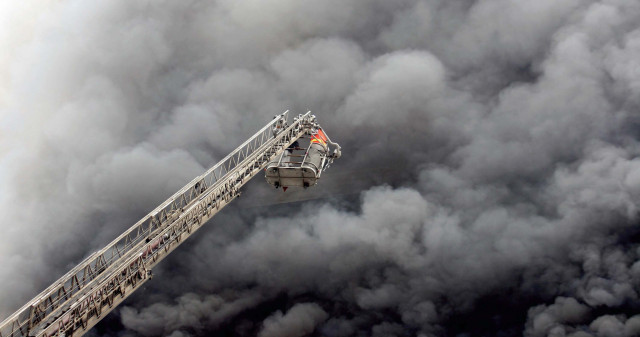Good riddance: The year that will not be remembered
High-profile assassinations, CNG blasts and a slew of financial irregularities marred 2011.

From Imran Khan’s inquilab to gas and electricity load shedding to national-security-threatening memos, a number of events ranging from strange and exciting to predictable and morose took place around the capital in 2011.
While most residents of Islamabad would be happy to note that 2011 passed by relatively peacefully, the federal capital was the scene for two of the highest profile incidents of terrorism this year.
The new year had barely dawned when Punjab Governor Salmaan Taseer was murdered in one of the city’s most posh market areas. The assassin: a reactionary member of his own security entourage. A few months later, Federal Minister for Minorities, Shabaz Bhatti, met the same fate, but his assassination remains unsolved.
All the while, the activities of certain banned groups, reincarnated under new identities have been going unchecked.
The recent resurfacing of the Jamia Hafsa issue also illustrates the Islamabad administration’s inability to combat land grabbing in general and extremist ideology in particular. A tussle over a mosque in F-11 further illustrated the lack of desire to touch upon religion, even with the backing of the legal system.
Security
A quack selling homebrew aphrodisiacs was busted after his clients complained of loss of kidney function. The quack claimed to have worked for former US president Ronald Regan, but no Raymond Davis-esque deals were made for his release.
A blast in a multi-CNG cylinder van took nine lives and brought the issue of unsafe cylinder installation in public transport to the fore, while a few Adiala jail inmates prank calling lower court judges while pretending to be the Supreme Court registrar got their comeuppance in June. Unsurprisingly, the ringleader was in jail for fraud.
A lover’s suicide pact gone wrong left a boy dead and a girl in panic, although she did turn out to be a better shooter than the one that tried and failed to kill under-trial murder accused Rana Sarwat on court premises not once, but twice.
Later in the year, the United Bank Limited building in Blue Area lit up for four hours, killing one, before the fire brigade managed to put out the fire and save those inside, including seven passersby who were trying to help people out and got stuck inside.
Education
The state of public schools in Islamabad is considered to be far better than much of the country, but a severe threat to students was highlighted in October, when a girls school in neighbouring Rawalpindi was attacked by a righteous, yet strangely shy brigade of masked seminary students. Around 70 men armed with iron rods barged into the school to demand an end to the students’ ‘obscene’ practice of sitting unveiled in the MC Girls School in Satellite Town. Parliament may have debated the issue and directed the local authorities to get to the bottom of the shocking episode, but the police still have not registered a case.
Men with guns are apparently no match for boys with sticks, which was proven again in early December, when the national disaster called the Rawalpindi board’s HSSC-I result rechecking was delayed. Students burnt down the board’s office in protest, raising the question of what the enhanced police presence in the twin cities is actually securing.
Infrastructure development
The CDA, which used to be considered one of the few financially responsible government agencies, continued spiralling downwards as no less than 15 recently executed and ongoing megaprojects are being probed by the FIA, NAB, parliamentary committees and the courts. Projects like the Zero Point Interchange remain incomplete despite the passage of four deadlines. The delays have seen the cost of the project double. The dualisation of Lehtrar Road faced a similar fate, with the one billion rupee project missing two deadlines and remaining incomplete.
At the same time, 800-odd home-based offices, embassies and restaurants remain unaffected, despite the purported ban on such establishments. Apparently the agencies officials can’t find them, even when they go to grab a bite in them.
Allergy sufferers were too busy trying to keep their noses from flying off to give the civic agency a piece of their minds, as the dreaded paper mulberry trees around town kept noses running and sinuses aching. Meanwhile, air pollution levels continue worsening and the proposed mass transit system remains an invisible mass.
This year also exposed the flood vulnerability of the capital, and especially its most prominent structures. The President’s place of residence was flooded, along with Parliament House, the Jinnah Convention Centre and the highest court in the land. Commuters stuck on the flooded roads were a regular sight during the monsoon season, as drainage, though better than many other cities, remains a problem.
Health
The twin cities were comparatively safe from the dengue outbreak, especially when compared to Lahore. Federal hospitals suffered a blow during the implementation of the 18th Amendment, and later due to the YDA strikes, which left all non-emergency wings in these hospitals on hiatus for the better part of two months.
Published in The Express Tribune, January 1st, 2012.

1724319076-0/Untitled-design-(5)1724319076-0-208x130.webp)

















COMMENTS
Comments are moderated and generally will be posted if they are on-topic and not abusive.
For more information, please see our Comments FAQ